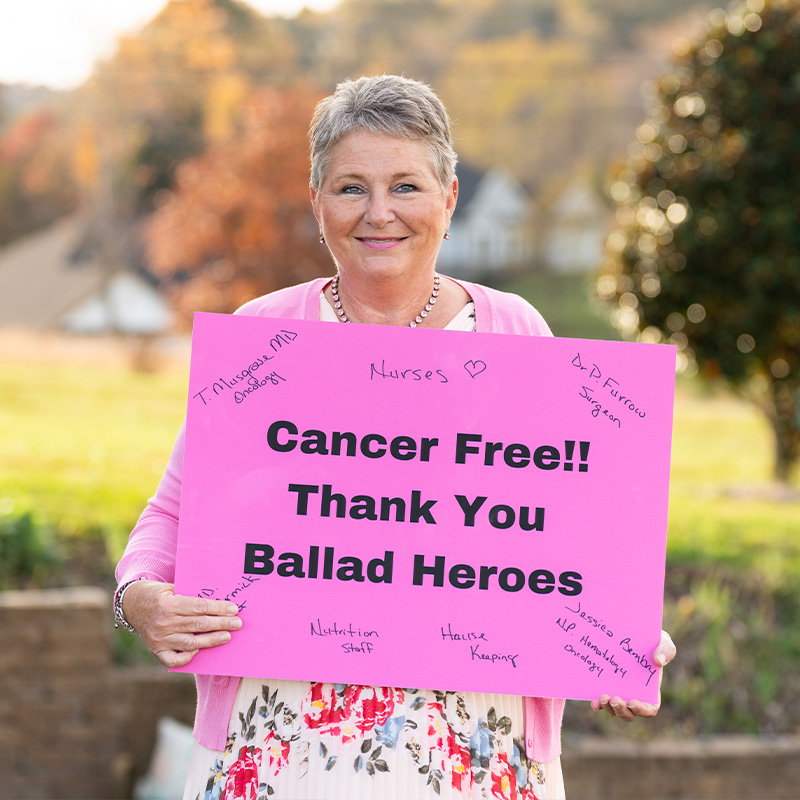Visit Vale Health Marketplace?
You are leaving balladhealth.org to visit Vale Health’s Wellness Marketplace.
Disclaimer: Ballad Health does not sponsor, endorse or recommend any product or resource listed in the marketplace.

Early detection, genetic testing and a 3D mammogram saved Carrol’s life.
Carrol, a breast cancer survivor, credits her survival to early detection and the power of genetic testing. And now she gets to spend time with her new granddaughter, Levi.
“She is the best baby,” Carrol says. “I never thought I’d ever have a grandchild. You hear people say you love your grandchild more – it’s a different love. I didn’t realize how much love I have for a little child. I’ve always had a reason to live, but Levi has definitely brightened my life.
Finding out she had cancer and acting quickly with the help of genetic testing and advanced screening ensured Carrol was still around when Levi was born. Carrol’s mother had been diagnosed with stage four pancreatic cancer, and doctors told the family that if the disease was genetic, it would be “fast and furious.” Sadly, Carrol’s mom passed away less than four months later.
“I remember reading, ‘Worrying is like a rocking chair’ — it gives you something to do, but it gets you nowhere,” Carrol says. “My mom worried too much, and I try not to. When she got cancer, I knew I had to face things head-on.”.
I remember reading, ‘Worrying is like a rocking chair’ — it gives you something to do, but it gets you nowhere.
After her mother’s diagnosis, Carrol was encouraged to undergo genetic testing at Ballad Health Medical Associates Hereditary and High-Risk Cancer Clinic in Kingsport. At first, she hesitated because she didn’t want to miss work. “I didn’t want to, but I said yes,” she says.
The testing revealed she carried the ATM gene mutation, which increases the risk of breast, pancreatic and ovarian cancers. “They told me I could go ahead and have bilateral mastectomies,” Carrol said. “I told them I wouldn’t do that unless I had cancer.” Instead, she agreed to additional imaging.
That decision soon came with sobering news: an MRI revealed suspicious findings, and a 3D mammogram followed by a biopsy confirmed the presence of breast cancer.
Carrol weighed her treatment options carefully. “I could have done a lumpectomy or just one mastectomy, but so many people do that and the cancer comes back. I chose the bilateral.”
Her family’s cancer history weighed heavily on her. “My family tree is huge as far as cancer goes,” she said. “My daddy had liver cancer. My paternal grandmother had breast and uterine cancer at the same time. And there’s more on Mama’s side.”
Carrol has encouraged her children to consider genetic testing as well. Her daughter tested negative for the ATM gene. “Praise the Lord,” Carrol said. “My son doesn’t want to know, and that’s his choice.”
She also continues to see the same oncologist who treated her mother. During a recent appointment, her doctor told her, “Your mom and genetic testing saved your life. A couple of months later, and it would have been a different story.”
Carrol knows there’s always a chance her cancer could return, but she chooses not to dwell on it. “I ain’t going to worry about it,” she said. “We’re just going to go on. My coping mechanisms are my Jack Russell, kayaking on Boone Lake and fly fishing.”
Her advice to others is simple: “Please, get your mammograms and your genetic testing. It could save your life.”